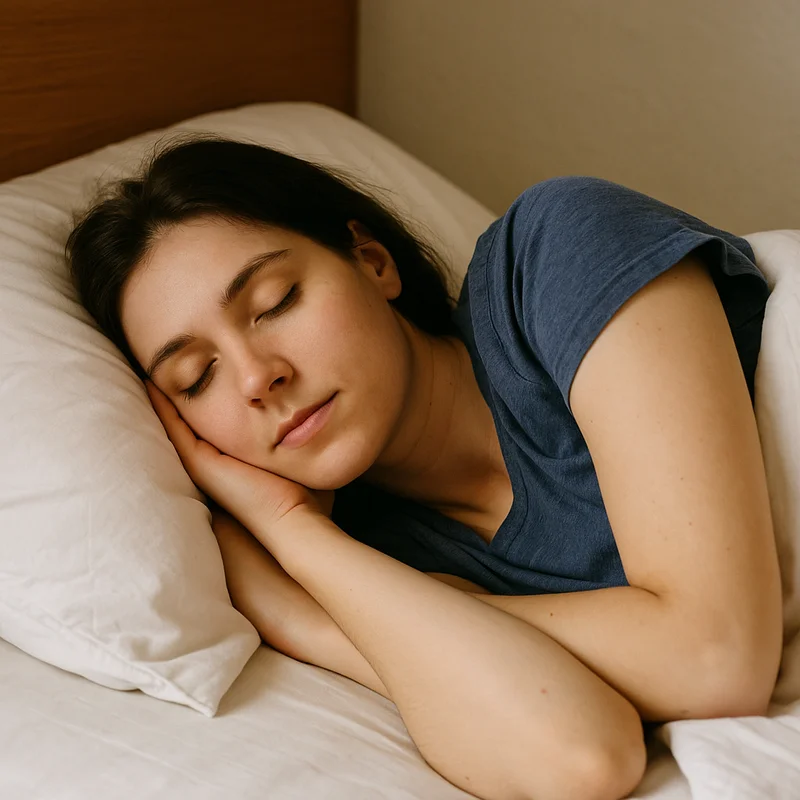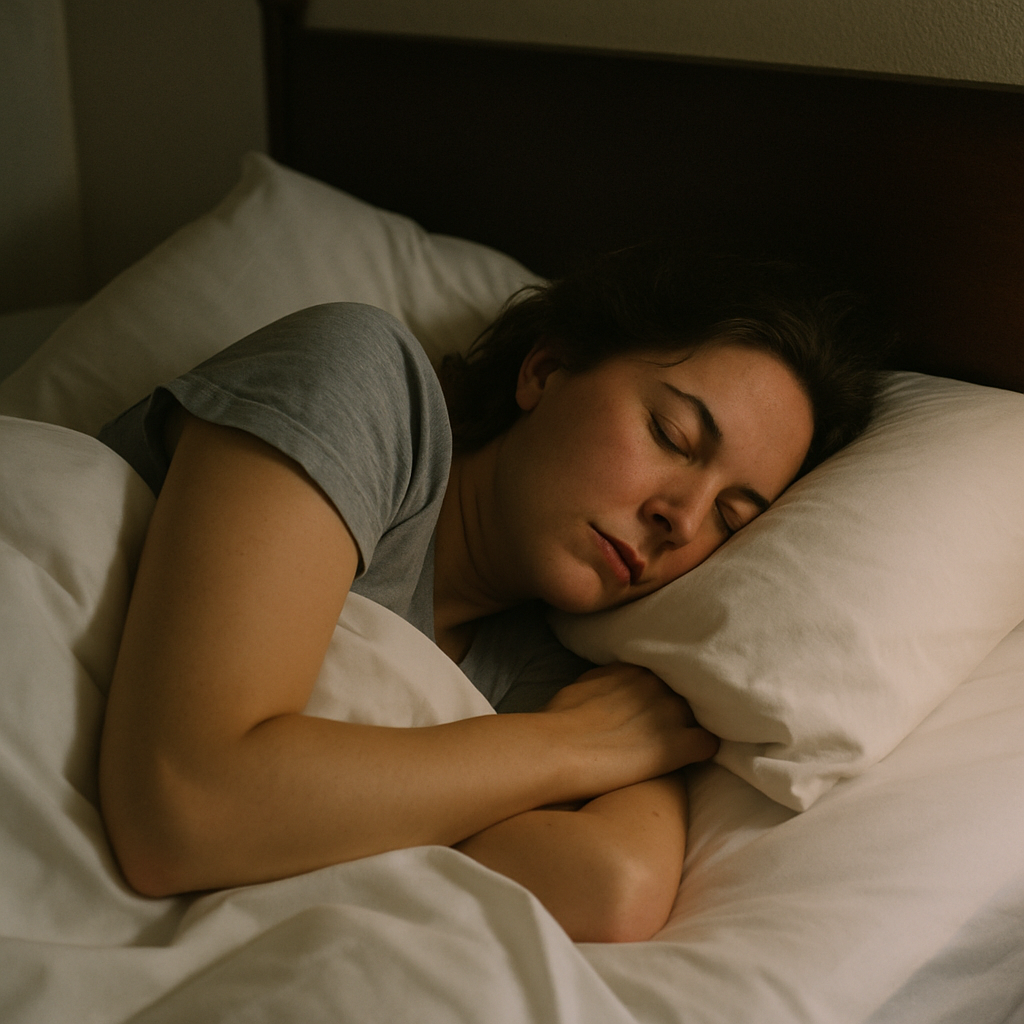How Much Deep Sleep Do You Need? Science & Ayurveda Insights

Ever woken up feeling like you never slept at all, even though you clocked a solid eight hours? Yeah, that used to be me, too. For a long time, I didn’t understand how sleep quality mattered just as much as quantity. Turns out, the true MVP of your nightly cycle is deep sleep — not just more sleep, but better sleep. And here’s the twist: the amount of deep sleep you need isn’t the same for everyone. Age, stress, lifestyle, even your body type (hello, Ayurveda!) can change the equation.
So how much deep sleep do you need? Is there such a thing as an ideal deep sleep time? Let’s break it down — science, tradition, and a few real-life tips that might just change the way you rest.

What Is Deep Sleep?
Sleep stages explained
Sleep isn’t one flat block of unconsciousness. It's more like a cycle — kind of like spinning through different radio stations in the middle of the night. You've got light sleep, REM sleep, and then there's the heavy hitter: deep sleep, also called slow-wave sleep or Stage 3 NREM.
This is the phase where your body gets to work on real repair jobs — muscle growth, immune strengthening, cell regeneration. It’s also when your brain clears out waste, like digital spring cleaning. Basically, without enough deep sleep, you’re running on a cluttered hard drive.
Why deep sleep matters
Okay, here’s something that blew my mind: even if you sleep for 9 hours, if your deep sleep time is too short, you can still feel foggy, cranky, and weirdly anxious the next day. Deep sleep benefits include:
-
Physical restoration (muscles, tissues, even skin)
-
Emotional balance (yep, it helps regulate mood)
-
Memory and learning support
-
Hormonal balance (like cortisol and growth hormone)
It’s no exaggeration to say that deep sleep is foundational to overall well-being. Skimp on it too often, and the whole system wobbles — digestion, focus, even your immunity.
How Much Deep Sleep Is Recommended?
Ideal amounts by age
Let’s not kid ourselves: babies and teenagers get the jackpot. The ideal deep sleep ranges shift as we age.
-
Infants: Around 50% of their sleep is deep sleep.
-
Teens and young adults: 1.5–2 hours a night is typical.
-
Adults (30–60 years): Roughly 13–23% of total sleep — that’s about 1–2 hours if you sleep for 7–8 hours.
-
Older adults: Deep sleep naturally decreases, sometimes dipping below 1 hour.
That said, if you’re 50 and still pulling a consistent 90 minutes of deep sleep nightly, you’re probably doing something right. Or you’ve got sleep genes the rest of us envy.
What affects sleep quality
A dozen little things can mess with your deep sleep:
-
Stress (obviously)
-
Caffeine too late in the day
-
Screens before bed
-
Irregular sleep schedules
-
Noise, light, even temperature
And here’s where natural sleep balance comes in — the idea that your body wants to sleep well, but it needs the right conditions to get there.
Ayurvedic View on Rest and Regeneration
You don’t have to buy into every part of Ayurveda to appreciate how tuned-in this ancient system is when it comes to sleep. It doesn’t talk about "REM" or "sleep stages" exactly, but it nails something that modern science often skips over: the why behind your sleep patterns.
Dosha-based sleep issues
In Ayurveda, your sleep tendencies are shaped by your dosha — your unique mind-body constitution. Quick recap:
-
Vata types (air + space): light sleepers, often restless, prone to waking up at odd hours — especially around 2–4 AM. They might overthink or worry before bed.
-
Pitta types (fire + water): sleep fine, but often wake up hot, sweaty, or annoyed. Their minds race with unfinished to-do lists.
-
Kapha types (earth + water): the heavy sleepers of the zodiac. They can fall asleep anywhere, but may oversleep or feel groggy in the morning.
Each dosha’s sleep imbalance comes with its own brand of chaos. And guess what? Your deep sleep time is affected, too. Vata folk might not get enough. Kaphas might have deep sleep but still feel dull. Pittas? They burn through their rest like it’s a deadline.
This framework helped me stop blaming myself for being a bad sleeper. Turns out, my ideal deep sleep routine wasn’t about copying some Silicon Valley biohacker’s night plan. It was about working with who I actually am.
Balancing routines for rest
So, how do you bring balance back? Ayurveda’s advice is wonderfully boring — and deeply effective. Some things to try:
-
Vata types: Warm baths, heavy grounding foods (think stews, sweet potatoes), self-massage with sesame oil before bed. Stick to the same sleep time every night, even on weekends.
-
Pitta types: Cooling herbal teas (brahmi, mint), early dinners, calming nighttime rituals. Avoid arguments or intense TV shows before bed — yeah, seriously.
-
Kapha types: Lighter evening meals, stimulating herbs (like ginger or cinnamon), and earlier wake-up times. Movement in the evening (a walk or stretching) can help the body transition into healthy sleep, not just crash-mode.
None of this is magic, by the way. You won't turn into a deep-sleeping monk overnight. But over time, these practices support natural sleep balance — and that’s where the real healing starts.
Tips to Improve Deep Sleep
Let’s say you’re not into doshas, or you’re still not sleeping deeply. What else can you do? Plenty.
Before-bed practices
Here’s the thing: your body’s pretty smart, but it needs a heads-up that sleep is coming. Most of us go from TikTok to teeth brushing to lights out — way too abrupt.
Try this instead:
-
Wind down 90 minutes before bed — read a book, stretch, journal.
-
Lower the lights — your brain needs darkness to kickstart melatonin.
-
No screens — and I know, I know, that one’s hard. But even 30 minutes helps.
-
Set a regular bedtime — yes, even on Saturdays.
Foods, herbs, and oils
Here’s where Ayurveda shines again. Some natural allies for deeper sleep:
-
Ashwagandha: good for stress-based insomnia.
-
Nutmeg: a pinch in warm milk — an old-school remedy that still works.
-
Chamomile and brahmi tea: simple, calming, effective.
-
Lavender or jatamansi oil: a few drops on your pillow or temples can shift your energy.
Some folks swear by tart cherry juice for melatonin. Others find bananas (magnesium!) or kiwis (seriously) help. You’ve got to experiment a bit. Sleep is personal.
How to Track Deep Sleep
You ever check your sleep tracker in the morning, see a bunch of colorful bars, and think, cool… but what does any of this mean? Same. Tracking your deep sleep is useful — if you do it with the right expectations.
Wearables and signs
Most modern wearables (think Fitbit, Oura, Whoop, Apple Watch) can give you a pretty solid estimate of your deep sleep time. They do this by monitoring heart rate variability and movement patterns. But here’s the catch: they’re not perfect. Studies show they can misclassify sleep stages, especially if your sleep is fragmented or if you’re a restless sleeper.
So while the numbers help, don’t obsess over them. Instead, use them to spot trends. Is your deep sleep tanking every time you eat late? Are you doing better on nights when you meditate? That’s gold.
Also, your body gives you feedback, even without a gadget:
-
Do you wake up clear-headed or foggy?
-
Do you hit a wall at 3 PM or feel steady throughout the day?
-
Are your cravings, moods, or energy erratic?
These signals are just as real — and often more useful — than data points.
Improving consistency
Here’s an annoying truth: it’s easier to fix one night of terrible sleep than to maintain consistent good sleep. But consistency is where deep sleep thrives.
A few tips that actually work (most of the time):
-
Keep your bedtime and wake time within a 30-minute window, even on weekends.
-
Don't overcorrect after a bad night. One bad night doesn’t mean you need to “make up” for it with a 10-hour nap fest.
-
Think of your bedtime routine as sacred — even if it’s short. The predictability itself helps your brain wind down faster.
And don’t forget — lifestyle counts. Regular movement (even walking), sunlight in the morning, hydration, a little laughter… they all stack up to support natural sleep balance.
Conclusion
So, how much deep sleep do you need? There’s no single answer. But for most adults, aiming for 1–2 hours of deep sleep per night is solid. That’s the sweet spot where the body repairs, the mind declutters, and life just feels a little more manageable.
But beyond the numbers, the real win is building a relationship with your rest. Understanding your sleep stages, tuning into your dosha (if that resonates), and making a few simple shifts can go a long way.
Don't aim for perfection. Aim for awareness. That’s where healing starts — night by night.
FAQs
How many hours of deep sleep should I get?
Most adults need 1–2 hours of deep sleep each night, which makes up about 13–23% of total sleep. It varies based on age, lifestyle, and stress levels.
What happens if I don’t get enough deep sleep?
You might feel physically drained, emotionally off, and mentally foggy. Long-term, poor deep sleep affects memory, immunity, and even weight regulation.
How to improve deep sleep naturally?
Wind-down routines, consistent sleep/wake times, magnesium-rich foods, calming herbs, and avoiding screens late at night all support better deep sleep.
Does Ayurveda offer specific remedies for better sleep?
Yes. Ayurveda uses dosha-specific routines, herbs like ashwagandha and jatamansi, and practices like oil massage and early dinners to support sleep quality.
Got any more questions?
Ask Ayurvedic doctor a question and get a consultation online on the problem of your concern in a free or paid mode.
More than 2,000 experienced doctors work and wait for your questions on our site and help users to solve their health problems every day.

